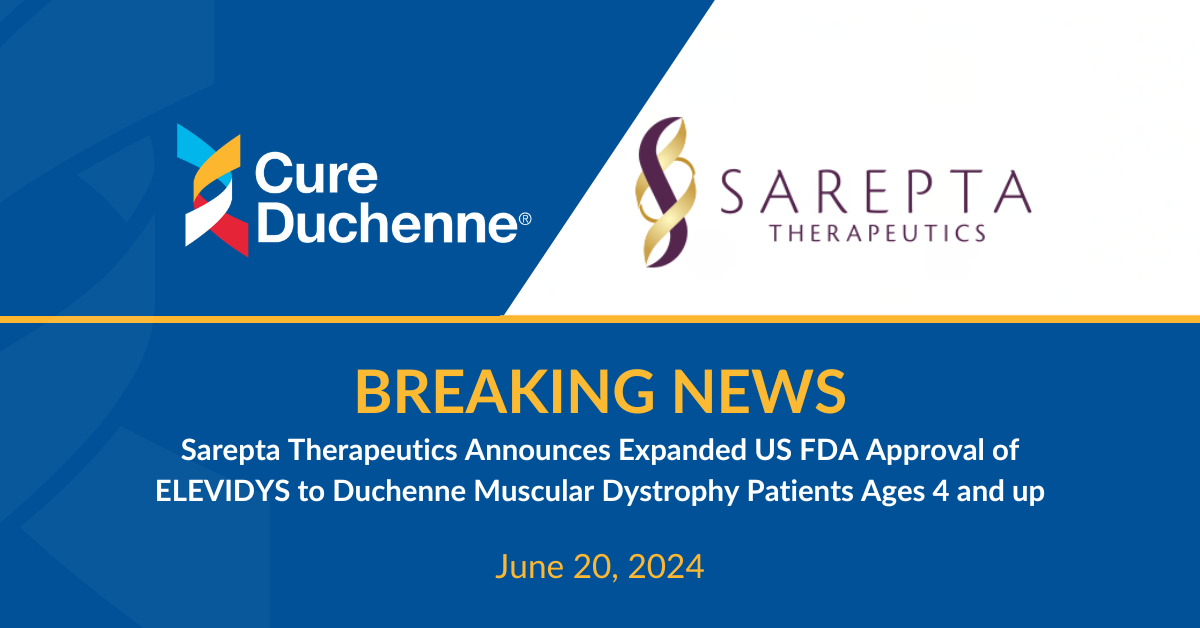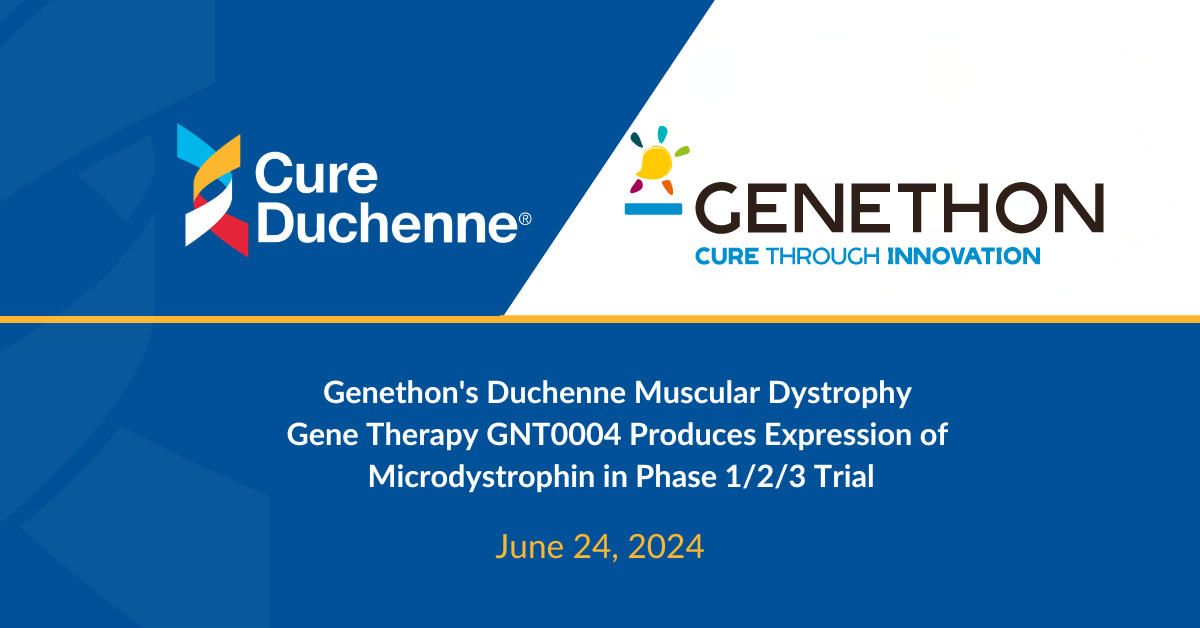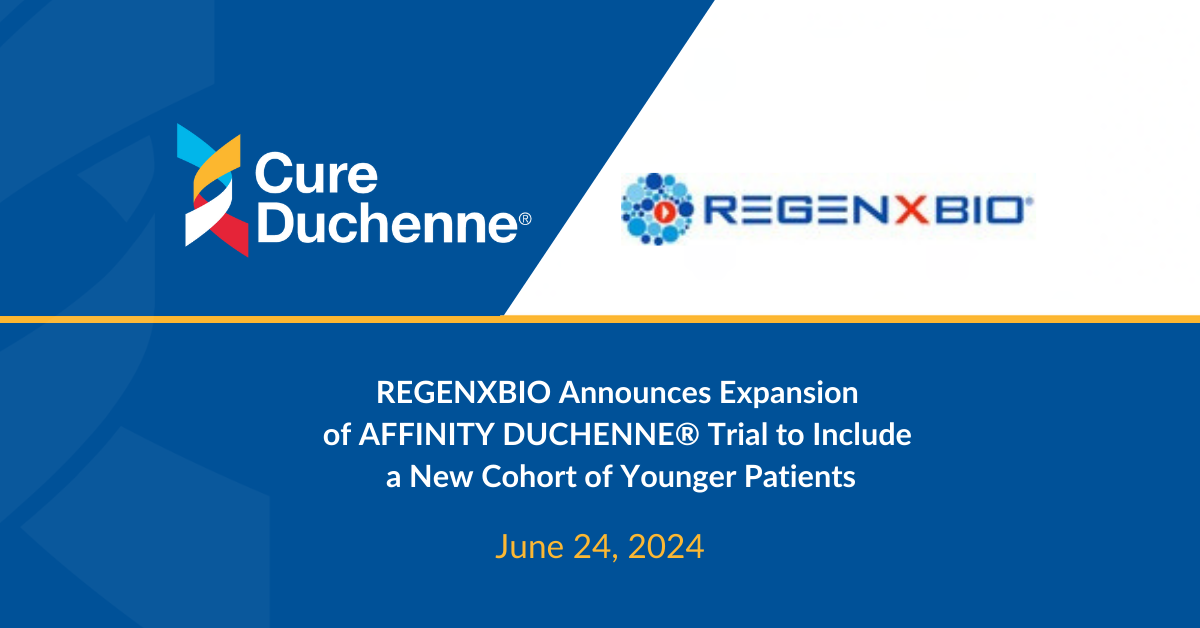Sarepta Therapeutics Announces Expanded US FDA Approval of ELEVIDYS to Duchenne Muscular Dystrophy Patients Ages 4 and Above

See the previous update from June 22, 2023 here
FDA Grants Traditional Approval for Ambulatory Individuals and Accelerated Approval for Non-Ambulatory Individuals to Sarepta Therapeutics’ ELEVIDYS Gene Therapy for Duchenne Muscular Dystrophy
We are pleased to share that Sarepta Therapeutics’ gene therapy for Duchenne, ELEVIDYS, has been granted traditional approval for ambulatory individuals and accelerated approval for non-ambulatory individuals by the FDA for individuals with Duchenne with a confirmed mutation in the DMD gene who are 4 years of age and above. The new expanded product label for Elevidys can be found here.
First approved by the FDA under the accelerated approval pathway for boys ages 4-5 with Duchenne in June 2023, ELEVIDYS is the first approved gene therapy for Duchenne.
CureDuchenne will be hosting webinars on Tuesday, June 25, in English and Spanish to share more about this news, with a representative from Sarepta Therapeutics joining as a guest for a Q&A session.
Register to attend:
- English Webinar: Tuesday, June 25, 2024 at 3:00pm PST
- Spanish Webinar: Tuesday, June 25, 2024 at 4:30pm PST
Aligned with our mission of driving early and critical Duchenne research, CureDuchenne is proud to have provided early funding to the company which later became Sarepta, helping them move forward and become the company they are today, with three FDA approved exon-skipping drugs for Duchenne and now an approved gene therapy drug for Duchenne.
We are grateful to Sarepta for their commitment to developing therapies for rare diseases and for their tireless work in bringing this gene therapy product to fruition. We are also incredibly grateful to all of the families who have participated in clinical trials and played such an important role in advancing research.
CureDuchenne has supported and committed resources to Duchenne gene therapy research from the beginning and we believe it has the potential to provide a significant therapeutic benefit for some individuals. But we are far from done. CureDuchenne has already been supporting research to overcome the challenges with this first generation of micro-dystrophin gene therapy products, and we remain dedicated to supporting the Duchenne community and researchers as we work to find further treatments for Duchenne.
How does ELEVIDYS work?
ELEVIDYS (delandistrogene moxeparvovec-rokl) is a single-dose, adeno-associated virus (AAV)-based gene transfer therapy for intravenous infusion designed to address the underlying genetic cause of Duchenne muscular dystrophy. ELEVIDYS delivers a truncated copy of the dystrophin gene to muscle cells, providing patients the ability to produce the micro-dystrophin protein in their muscles. This has the potential to halt/slow progression of the disease and improve muscle function in Duchenne patients. However, there are some limitations to ELEVIDYS to be aware of. It is a one-time treatment because it is administered using an AAV virus. The patient’s immune system reacts by producing neutralizing antibodies to the virus after treatment that prohibits the administration of a second dose. Additionally, anyone who has developed antibodies through environmental exposure to the AAVrh74 viral vector used (a relatively small percentage of patients), can also not be treated with ELEVIDYS.
How can I access ELEVIDYS?
If you have questions about accessing one of Sarepta’s approved therapies and you live inside the United States
- Please contact SareptAssist by calling Call 1-888-SAREPTA (1-888-727-3782), or emailing sareptassist@Sarepta.com
- SareptAssist is available Monday through Friday, 8:30am – 6:30pm ET
- More information about SareptAssist may be found here: https://www.sarepta.com/sareptassist
If you have questions about the clinical development programs sponsored by Sarepta please reach out to advocacy@sarepta.com
If you are calling from outside the United States, you should consult with your Physician for information pertinent to your care. You may email advocacy@sarepta.com and your question will be routed as appropriate
Looking to the future
While the expanded approval of Sarepta’s gene therapy for Duchenne is a significant milestone, we must remember that there is still much work to be done to treat all patients in the search for a cure for this disease. Gene therapy is a promising approach but is not a one-size-fits-all solution. It is crucial that we continue to support research and development to overcome the existing challenges of gene therapy.
In that respect, CureDuchenne has been working on potential solutions so that individuals with neutralizing antibodies (nAbs) from prior environmental exposure to an AAV may also be dosed. These strategies may also provide a path forward where redosing of individuals who have received a prior AAV therapy may also be possible. Our strategy is comprehensive, and includes funding the development of new, modified AAV viruses with improved muscle targeting (e.g. Shape Therapeutics, 4DMT) as well as other strategies to reduce the dose, improve safety, and ease the burden on manufacturing a drug product (Insmed). We’ve also supported the development of the Evader gene delivery platform (Chameleon Biosciences), which aims to shield the AAV virus from detection of the immune system, and if successful to allow dosing of patients who are seropositive to an AAV and, importantly, redosing when required.
We have also taken an early initiative to fund the development of non-viral gene delivery technologies, which not only get around pre-existing immunity to AAV, but also are not restricted by cargo size. These experimental therapies ostensibly could deliver larger gene transcripts, potentially including the full-length dystrophin protein (e.g., CODE Biotherapeutics, Myosana Therapeutics). These approaches, if successful, would also effectively address redosing concerns.
Moreover, CureDuchenne remains very optimistic about exon skipping approaches to restoring large dystrophin constructs in muscle and continue to look for other approaches that would delay the progression of the disease. We recognize that Duchenne is a complex disease, and we need to have many approaches to treating it.
Additionally, we must continue to support clinical trials and the collection of real-world data to ensure that treatments are safe, effective, and accessible to all those affected by Duchenne. CureDuchenne is committed to working towards a cure for all individuals with Duchenne, and we will not rest until everyone has access to transformative treatments.




